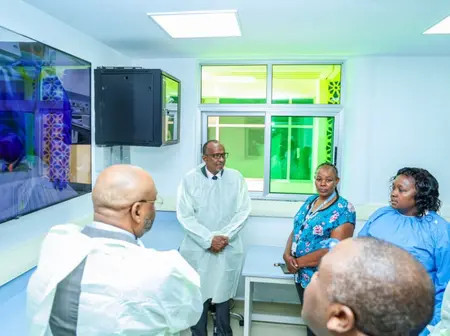Health Cabinet Secretary (CS) Aden Duale has announced the official commissioning of a cutting-edge Polio Laboratory at the Kenya Medical Research Institute (KEMRI), positioning Kenya as a key player in global disease surveillance and outbreak response.
The expanded facility at KEMRI’s Centre for Virus Research will operate as both a National and Inter-country Reference Laboratory, serving Kenya, Somalia, Djibouti, Eritrea, and Comoros.
It will provide faster, more accurate diagnostics, real-time genomic sequencing, and stronger preparedness for potential outbreaks.
Developed in partnership with the World Health Organisation (WHO), the Bill & Melinda Gates Foundation, eHealth Africa, and other global health partners, the lab is a significant boost in the fight against polio.
Beyond polio, it will function as a multi-pathogen genomic platform, already sequencing Mpox, measles, rubella, and enteric viruses—making it a frontline defence hub for the region.
Duale described the launch as a milestone in Kenya’s compliance with International Health Regulations (IHR) and a direct contribution to global health security. The initiative also ties into the government’s Bottom-Up Economic Transformation Agenda (BETA) by strengthening healthcare systems and empowering communities.
“This lab is one of its kind in our region because it will help us reduce our reliance on external labs in other countries, such as South Africa, where the tests used to be sent,” Duale stated.
“This lab will provide our scientists in KEMRI with a platform for innovation and research, and it will turn Kenya into its ambitious programme to be a continental health science lab.”
The event brought together top medical leaders, including Acting KEMRI DG Dr. Elijah Songok, KEMRI Chairperson Dr. Abdullahi Ali, PS Medical Services Dr. Ouma Oluga, DG for Health Dr. Patrick Amoth, and outgoing WHO Country Director Dr. Abdourahmane Diallo.
With this new lab, Kenya is not just safeguarding its borders but also stepping up as a regional leader in epidemic preparedness and disease eradication.
Across Kenya and much of Africa, weak medical laboratory infrastructure has long posed a major obstacle to healthcare, limiting accurate disease diagnosis and slowing research progress.
The shortage has fueled understaffing, reliance on substandard diagnostic tools, and poor medical data management—factors that especially undermine healthcare delivery in rural areas.
A Global Young Academy survey conducted last year found that 80% of young African researchers had considered leaving the continent due to these barriers, while 60% were thinking of changing careers altogether.
The report, titled The Global State of Young Scientists (GloSYS) Africa, underscored the pressing need for greater investment and funding in medical research facilities across Africa.

Leave a Reply